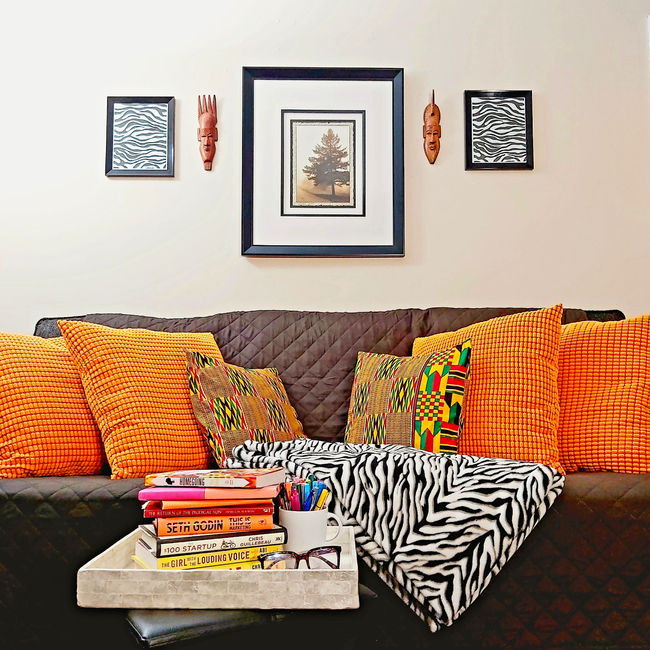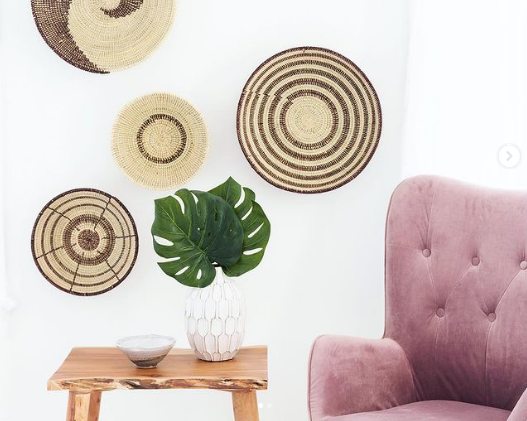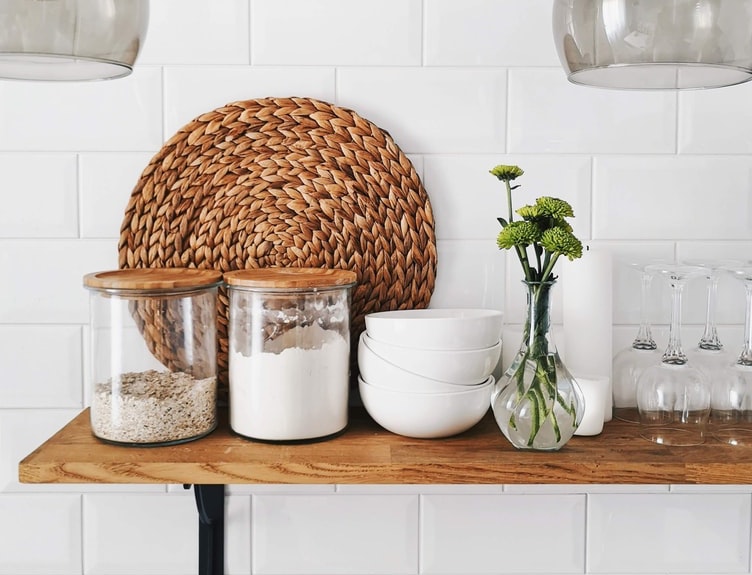This Ceramic Artist’s Clay Creations are Rooted in African Culture
Pottery by Osa’s clay works might be influenced by African culture but they have a distinctly unique mass appeal that’s universal and lasting. Osa Atoe is a Nigerian-American ceramicist with a degree in Sociology who left her then career after taking community pottery classes in 2013. Her pottery practice eventually grew out of her kitchen in New Orleans, Louisiana and now occupies a full-sized studio at her current home in Sarasota, Florida. To fully understand the scope and influence of Atoe’s work, we can be moved to reflect on the complex history of African pottery and Black artists.

In the 19th century, enslaved African American stoneware potters (many of whom are largely unknown) brought their West African clay and art-making skills along with them. At the time, Old Edgefield District in South Carolina was the epicentre of stoneware production and the pottery industry for decades preceding the Civil War where enslaved labour was used to meet the demands of production. One of such historic artists from there was David Drake (c. 1800–1870s), an enslaved potter whose work was later featured by the Metropolitan Museum in 2020 when they acquired one of his stoneware pieces.
In general, I regard the craft of the Old Edgefield District workers as a form of resistance and resilience. They speak to the lived experience and courage of the people in preserving the traditional art forms and techniques they brought with them. Atoe’s art may not be directly linked but the philosophy is similar to one behind the pottery crafts of Old Edgefield in the sense that her clay creations mostly draw on West African heritage arts.

225 Magazine states that Atoe’s art is predominantly influenced by many cultures of the world, but particularly draws inspiration from her Nigerian roots, and some elements of Greco Roman and Native American cultures. And yet, her pottery is also inherently American, a symbolic reflection of the melting pot that the U.S. society stands for.
In analyzing her African pottery closely, you will also notice the frequent use of lines and other geometric shapes and this reminds me of early Nok art or pottery, which is characterized by incised lines, covering majority of the surface. Linework however is a universal art and can be tied to different cultures in many parts of the world. Atoe explains more about the all-inclusiveness of her craft in the video below.
One industry elder and educator whom Atoe is inspired by is David MacDonald whose work has been featured extensively in various museums in New York and beyond. Watch the two minute teaser for “Vessels for the Human Spirit,” an upcoming feature-length documentary about the life and work of master potter and retired Syracuse University ceramics professor David MacDonald. Interestingly, the documentary is also directed by Atoe and in collaboration with Amilca Navarro.
According to Everson Museum of Art,
“For more than four decades, David MacDonald has masterfully created richly patterned utilitarian objects from clay that have come to symbolize tremendous integrity and endurance. Despite the national recognition MacDonald has earned for his superb work, he remains committed to, and most content when he is producing, functional works of art in beautiful forms that will be touched, held, and most importantly used by people who will admire and appreciate their inherent beauty.”
Learning from people in African pottery such as MacDonald in addition to Jabu Nala and studying the history of Ladi Kwali (c.1925 – 12 August, 1984) at Abuja Pottery Center during the 1950s has enabled Atoe to establish a sense of connection to her ancestors. Ladi Kwali or Ladi Dosei Kwali was a Nigerian potter, ceramicist and educator. She is famous for using the coiling technique to shape clay into vessels like water jars, cooking pots, and bowls.

Today, Atoe is encouraged and strengthened when she sees her art being used by diverse people in their daily lives. She pictures her clay pieces filling a need in homes for that morning coffee or tea, or as a treasured birthday or wedding gift and much more. To accomplish this, Atoe is fostering a strong sense of community via her Instagram page and even has a hashtag where past customers can post pictures of how they’re using their products from Pottery by Osa. This shows that people and community is central to Atoe’s work. Building on this concept, it becomes important for her to continue embedding themes about the universal nature of everyone’s humanity in her work.
When it comes to African pottery, Black creators often face a lack of visibility such that it is really hard to find mentors or be inspired by a sense of community. If you find yourself resonating with this statement, you might want to check out Atoe’s interview entry in Crafted Kinship — a visual journey of Caribbean art profiling more than 60 contemporary Black and Caribbean artists, curated by award winning multidisciplinary artist and textile surface designer, Malene Barnett.
The book is listed on Amazon and the description states…
“Through powerful interviews with more than 60 artists and designers of Caribbean heritage, accompanied by gorgeous photographs, Crafted Kinship takes readers on a unique journey through the world of Black Caribbean creativity. Each maker crafts a kinship with the land, the people, the culture of their country of origin. Their art explores and reflects deeply on themes like African origins, ancestors, Black womanhood/Black manhood, identity, joy, memory, and the complicated and painful history of migration and diaspora. An art that is more often than not multidisciplinary, created by makers who eschew traditional labels by reshaping the boundaries around art and design.”


In other news, Atoe is presenting at an event in the new year, 2025. The details are outlined below.
Women Working with Clay Symposium
Feature Presenter: Osa Atoe
Date: June 9-11, 2025, Hollins University, Roanoke, VA
Description: Presenting alongside Andrèa Keys Connell, Shikha Joshi, and Crystal Morey, I will be demonstrating the creation of my Earth Tone pots—wheel thrown, intricately carved pieces, decorated with a combination of glaze and terra sigillata made from both commercially available and wild foraged clays. I will show how I arrive at my voluminous wheel-thrown forms that are influenced by historical (often coil built) pots; how to plan and execute symmetrical and balanced geometric patterning; how to form functional and attractive handles and spouts; and how to create and apply refined decorating slips called terra sigillata. I will also bring clay samples and test tiles to show, as well as recipes to share.
Sources:
“About.” Osa Atoe, 2015, potterybyosa.com/pages/about
“Resistance and Resilience in Clay: How Enslaved African American Potters Gave Shape to Their Lives | the Huntington.” Huntington.org, 2024, huntington.org/verso/resistance-and-resilience-clay-how-enslaved-african-american-potters-gave-shape-their-lives
“Osa Atoe – People to Watch.” [225], 2018, www.225batonrouge.com/our-city/osa-atoe-people-watch-2018 Accessed 31 Dec. 2024.
“10 Facts You Need to Know about Nok Art.” Google Arts & Culture, artsandculture.google.com/story/10-facts-you-need-to-know-about-nok-art-yemisi-shyllon-museum-of-art/jgVRzgYY_kEJeQ?hl=en
“DAVID MACDONALD.” DAVID MACDONALD, 2024, www.davidmacdonaldpottery.com/ Accessed 31 Dec. 2024.
“New Acquisition: Ladi Kwali’s Water Jar.” Unframed, 3 May 2024, unframed.lacma.org/2024/05/03/new-acquisition-ladi-kwali-water-jar Accessed 31 Dec. 2024.
“Crafted Kinship: Inside the Creative Practices of Contemporary Black Caribbean Makers: Barnett, Malene: 9781648290992: Books – Amazon.ca.” Amazon.ca, 2024, www.amazon.ca/Crafted-Kinship-Practices-Contemporary-Caribbean/dp/164829099X Accessed 31 Dec. 2024.






